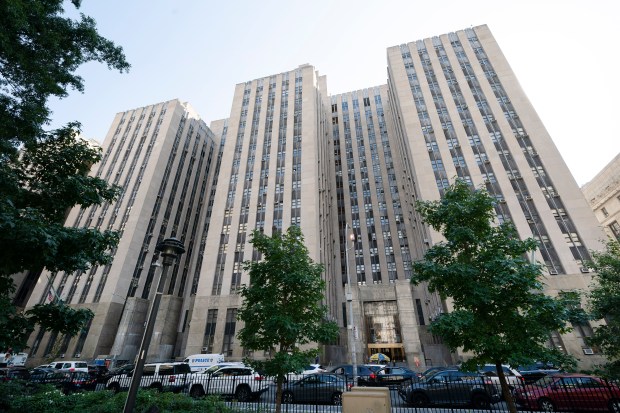A new program that aims to provide an exit ramp from the revolving-door justice system will boost access to services for New Yorkers in need with $3 million from Manhattan District Attorney Alvin Bragg’s office.
The investment in the Fortune Society-run program aims to fill holes in the city’s social safety net where they’re perhaps most clearly displayed — in arraignments. It will see courtroom-based outreach workers engage people arrested on low-level offenses when they would otherwise leave the courthouse with only a subway ticket, a return date and nowhere to go.
Bragg told the Daily News the “courtroom navigators” program seeks to recognize and remedy the life challenges that cause so many to remain tangled up in the criminal justice system, released time and again back into the circumstances that led them to offend.
“This is a cycle that many of us have seen for years and years,” he said. “They can literally put that person in a Fortune Society vehicle and ride with that person to a bed, provide that person with a bed and find out what else that person needs. … Recidivism being addressed by stabilizing people.”
Navigators, as they’re known, will staff Manhattan arraignments seven days a week from 9 a.m. to 1 a.m., offering to help people dealing with issues like poverty, homelessness and mental illness navigate complex paths to housing, substance use disorder and behavioral health treatment and other immediate and long-term services at the start of their cases.
The voluntary program adds a layer to a tattered patchwork of mental health services available to criminal defendants. It will operate parallel to court-mandated treatment interventions like supervised release, an alternative to jail focused on ensuring someone’s return to court that’s had limited success.
The city’s ad-hoc mental health courts — operated at will by a handful of judges — have shown strong results diverting participants away from the justice system permanently by bringing together a team to tailor the resolution of their case to their ongoing needs. However, admission is highly limited due to a lack of funding and has drawn criticism for the requirement that a participant admit guilt.

There are fewer options for those with mental health needs who fight their cases from jail.
According to city data, more than half of the roughly 6,000 people incarcerated on Rikers Island have a diagnosed mental illness — with one in five classified as severe.
While some efforts to remedy the situation have been made, according to the most recent report by federal monitor Steve Martin, the increased need for mental health services at the dysfunctional jail complex vastly outweighs the availability of help. More than a dozen detainees have died by suicide since the start of 2021.
Many of the 28 to die waiting for trial on Rikers since the start of 2022 struggled with mental illness, like Manish Kunwar, a 27-year-old Nepali man found unresponsive in his cell earlier this month.
An officer familiar with Kunwar’s cell block at the Taylor Center in the wake of his death told The News, “The basic needs of a human being are far beyond gone in that place.”
The courtroom navigators program, which will primarily serve those walking out of court with nowhere to go, is the second element of a mental health grant initiative launched by Bragg’s office and the CUNY Institute for State and Local Governance in December. The funding comes from $9 million seized from international banks in criminal investigations by the DA.
Bragg in June awarded $6 million to the nonprofit organization The Bridge to oversee the initiative’s first prong, connecting high-needs people spending significant time sleeping rough in Manhattan with wraparound services.
The trained navigators who will work to forge lasting connections with participants have experienced and overcome struggles with the criminal justice system, health needs and housing themselves, according to Stanley Richards of the Fortune Society.
“This investment reflects a visionary approach to address the underlying drivers of crime and violence at their root, aiming to reduce recidivism and create a safer, more supportive community,” he said.
Bragg hopes to hold up data a year from now that will compel state leaders to scale up navigator programs and install support in courthouses and communities where there is none in other jurisdictions.
“Stabilizing people, addressing the root causes of crime, obviously benefits that individual, but it benefits all of us,” he said.
This post was originally published on this site be sure to check out more of their content.






